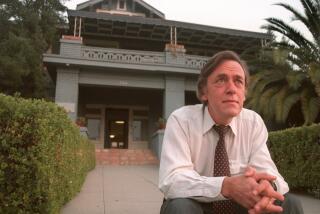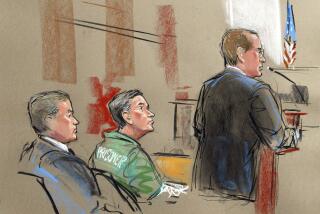Norbert Schlei, 73; Principal Author of Civil Rights Act, Other Landmark Laws
- Share via
Norbert A. Schlei, key lawyer in the Kennedy and Johnson administrations who found legal underpinning for the 1962 blockade of Cuba, wrote landmark civil rights legislation and once waged a strong bid to replace an entrenched Republican California secretary of state, has died. He was 73.
Schlei died Thursday at an acute care hospital in Los Angeles of infections caused by long-term immobility, his wife, Joan, said Saturday. She said Schlei had been virtually unconscious since suffering a heart attack March 25, 2002, while jogging in Santa Monica.
Considered a legal wunderkind, Schlei was the Democratic candidate for the 57th California Assembly District in 1962 when he was tapped by President John F. Kennedy as an assistant attorney general in charge of the office of legal counsel.
At the time, Atty. Gen. Robert F. Kennedy, the president’s younger brother, quipped that Schlei -- only 33 -- had been named so there would finally be “someone younger” than he in the Justice Department.
But Schlei, who clerked for Supreme Court Justice John Harlan after graduating from Yale Law School, proved a scholarly asset to the Kennedys and later to President Lyndon B. Johnson and Atty. Gen. Nicolas Katzenbach during crises and in forging the landmark Kennedy-Johnson civil rights reforms.
Schlei was the principal draftsman of the Civil Rights Act of 1964, the Economic Opportunity Act of 1964, the Voting Rights Act of 1965 and the Immigration Reform Act of 1967.
“I felt I was lucky,” Schlei told the New York Times in 1995, “because I was able to turn what ability I had to something important.”
Schlei had barely moved into his quarters in August 1962 as head of the office of legal counsel just vacated by Katzenbach, when he was put to work. The University of Mississippi had refused to allow James Meredith, a black student, to enroll that fall, and Kennedy sent Schlei to Oxford, Miss., to get Meredith into the school.
Hardly a month later, as the Cuban Missile Crisis developed, Kennedy asked Schlei to study the legal basis for presidential action in connection with Cuba after U.S. surveillance confirmed that Russia was installing surface-to-air missile sites in the Communist island nation. Schlei responded with what became Kennedy’s October justification for a naval quarantine on all offensive military equipment being shipped to Cuba.
“It is our view,” he wrote, “that international law would permit use by the United States of relatively extreme measures, including various forms and degree of force, for the purpose of terminating or preventing the realization of such a threat to the peace and security of the Western Hemisphere.”
The lawyer supported the view with references to self-defense rights, the collective and multilateral security obligations of the U.S. and the 1934 Cuban-U.S. Treaty, which established U.S. rights for its naval base at Guantanamo.
Although Schlei had to abandon his bid for assemblyman to go to Washington (incumbent Republican Charles Conrad was reelected), he tried for election in California four years later when he ran for secretary of state.
Schlei handily defeated six others in the 1966 Democratic primary, polling nearly twice as many votes as were received by his nearest competitor.
He also collected more than 2.7 million votes, a remarkable tally for a Democratic statewide office seeker in that penultimate general election against Republican Frank M. Jordan, incumbent for 23 years and at the time the only Republican statewide officeholder. Nevertheless, Schlei lost the general election Nov. 10, 1966, as Jordan was swept to victory in the Ronald Reagan Republican landslide.
Schlei, a personable Democratic campaigner, was only yards from Robert Kennedy at Los Angeles’ Ambassador Hotel when Kennedy was fatally shot on the night of the California primary in 1968. He largely bowed out of politics after serving as a delegate to the Democratic National Convention that year in Chicago.
A highly successful trial and securities lawyer who represented such clients as Howard Hughes’ Summa Corp. in lengthy litigation brought by ousted Hughes executive Robert Maheu, Schlei himself was tried in a Florida federal courtroom in 1995.
The charges and their aftermath were a cloud on Schlei’s brilliant career.
Schlei was acquitted of eight counts, including wire and bank fraud and money laundering, but was convicted by a jury of conspiracy and securities fraud for purportedly helping five others sell $16 billion in fake Japanese government bonds from the mid-1980s to 1992.
He was sentenced to five years in federal prison and lost his license to practice law for 3 1/2 years. But he never went to prison, remaining free on appeal. The 11th Circuit Court of Appeals vacated the judgment and, in 1998, Schlei abandoned motions for a new trial to clear his name. Instead he agreed to a negotiated settlement of a year’s unsupervised probation on one misdemeanor count of conspiracy to possess counterfeit foreign securities, and resumed his law practice in L.A.
Joan Schlei said Saturday that Schlei had been completely exonerated after federal prosecutors conceded that there was a “possibility the instruments are valid” and that Schlei had been wrongly prosecuted.
Schlei maintained all along that he had done nothing illegal, and that prosecutors who issued charges against the others after a sting operation had added him only because of his high profile in Democratic and government circles to “get in the papers” and make the trial “newsworthy.”
At issue were bonds the Japanese government claimed were counterfeit and created by a forger they imprisoned in 1983. Schlei countered that the securities were legitimate, that they had been issued in 1983 by Japan’s minister of finance, Michio Watanabe, at the request of former Prime Minister Kakuei Tanaka after Tanaka left office in a bribery scandal. Schlei said he had never sold the securities and had simply tried to help about 30 clients purchase them with the understanding that the securities would be redeemable only if they could persuade a current Japanese government to honor them.
Among the highly prominent character witnesses who testified on Schlei’s behalf during the trial was key Republican U.S. Sen. Arlen Specter of Pennsylvania, who had known Schlei since they were students together at Yale.
Born Norbert Anthony Schlei on June 14, 1929, in Dayton, Ohio, Schlei grew up in meager financial circumstances, taking odd jobs delivering papers and groceries to help his family. He paid his way through Ohio State University as a waiter, but managed to graduate with honors in English literature and international relations and earned three varsity letters for golf.
He served as a Navy officer during the Korean War and later went to Yale Law, where he graduated first in his class and was editor of the Yale Law Journal. After a year clerking for Harlan, he moved to Los Angeles in 1957 to work for the prestigious law firm of O’Melveny and Myers.
In 1959, Schlei helped form the firm Greenberg, Shafton and Schlei where he remained until he went to the Justice Department in 1962. In later years, he was associated with different law firms, most notably the Wall Street firm of Hughes Hubbard & Reed from 1972 until 1989, whose Los Angeles office he established.
He was co-author of “Studies in World Public Order,” a book on international law published in 1961, and in 1962 wrote the book “State Regulation of Corporate Financial Practices.”
Schlei sat on the boards of several corporations involved in international real estate and securities. Long involved in real estate development, Schlei had begun in 1959 to represent Janss Corp., which developed Westwood Village and the Conejo Ranch area near Thousand Oaks.
In addition to his wife, the former Joan Masson, he is survived by three sons and three daughters from his earlier marriages to Jane Moore and to attorney Barbara Lindemann -- William, Andrew, Bradford, Anne, Blake and Elizabeth; and four grandchildren. Two other sons, Graham and Norbert L. Schlei, preceded him in death.
Calling hours will be 4 p.m. to 8 p.m. Wednesday at Gates-Kingsley Funeral Home, 19th Street and Arizona Avenue, Santa Monica. Graveside services are planned for 11 a.m. April 29 at Forest Lawn Hollywood Hills.
His wife asked that memorial contributions be made to any of these organizations: Amnesty International, the American Heart Assn., the American Cancer Society, the ACLU or the Constitutional Rights Foundation.
More to Read
Get the L.A. Times Politics newsletter
Deeply reported insights into legislation, politics and policy from Sacramento, Washington and beyond. In your inbox twice per week.
You may occasionally receive promotional content from the Los Angeles Times.










